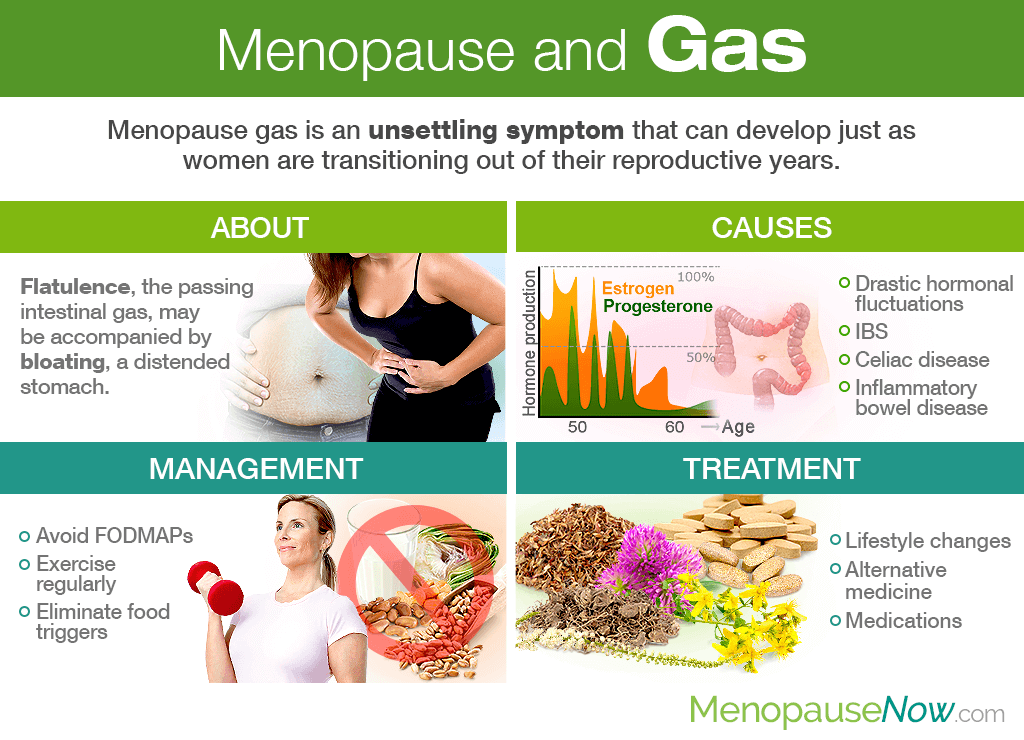Perimenopause gas is a complex symptom that causes many women to not be able to finish a meal without feeling uncomfortable, in more than one way. Continue reading to learn all about menopause and gas, including its causes, management, and treatment options for long-term relief and gastrointestinal health once and for all.
About Menopause Gas

Flatulence is the act of passing intestinal gas from the anus. It might be accompanied by a feeling of bloating, which is described as having a distended stomach and pain due to an accumulation of gas in the intestines.
In general, perimenopause bloating and gas can cause women to feel a sense of general discomfort and unease, adding to a laundry list of other menopause symptoms they may be suffering from.
Causes of Menopause Gas

Research is still developing concerning the role of estrogen and progesterone in increased gastrointestinal symptoms around the time of early menopause.
Nevertheless, it is believed that drastic fluctuations of both as women are winding down their reproductive years are at least partly at fault for menopause gas and bloating.
Other causes of menopause gas could be:
- Irritable bowel syndrome (IBS)
- Small intestinal bacterial overgrowth (SIBO)
- Gastroparesis
- Gynecological conditions
- Celiac disease
- Inflammatory bowel disease
- Constipation
- Cancer of the stomach, colon, or pancreas
- And more
How to Manage Menopause Gas

If you have a lot of menopause gas, here are some tips to relieve it so that you do not get bloated:
Avoid FODMAPs. When the body has a hard time digesting sugars from FODMAPs (fermentable oligosaccharides, disaccharides, monosaccharides, and polyols), bloating and flatulence can result. FODMAPs include wheat or rye; dairy foods; garlic; legumes such as chickpeas, lentils, or beans; artichokes; asparagus; nuts like pistachios and cashews; and honey.
Exercise regularly. Exercising frequently not only encourages proper peristalsis to beat gas during menopause, but it also boosts mood and helps maintain a healthy weight. Strive for 30 minutes a day, five days a week with additional strength training and aerobics.
Eliminate food triggers. For those who suffer from intolerances, like wheat or lactose, banishing the bloat can be as easy as cutting triggers out of your diet. Slowly reintroduce them one at a time to see if they were the underlying culprit.
Change habits. Chewing gum, using a straw, smoking, and consuming alcohol can all foster perimenopause flatulence.
Oftentimes, managing menopause gas involves combining aforementioned approaches to find a customized plan that suits your lifestyle and body's needs.
Nevertheless, optimal results can be found by tackling the underlying cause head on with menopause gas treatments.
How to Treat Menopause Gas

Women who are suffering from menopause gas and bloating in addition to other menopause symptoms would be wise to treat the hormonal imbalance at fault.
Natural and effective bloating treatments start with a healthy diet, regular exercise, and wholesome habits to encourage endocrine system health. Principally, menopausal women may start with implementing many of the abovementioned diet and exercise changes alongside a wholesome lifestyle that involves addiction control, stress management, and proper sleeping schedules.
Then, women can complement these holistic measures with alternative medicine, such as phytoestrogenic herbal supplements or hormone-regulating supplements. Both promote hormonal balance in their own way.
Phytoestrogenic herbal supplements, like black cohosh, red clover, or St. John's wort, contain strong concentrations of phytoestrogens, plant-based estrogens that act as the endogenous version in the body, thus remedying any estrogen deficiency. They are appropriate for short-term use as they introduce outside hormones into the body.
On the other hand, hormone-regulating supplements, like Macafem, nourish and encourage the endocrine system to produce more of its own hormones, thus allaying flatulence during menopause as well as hot flashes, night sweats, vaginal dryness, and more hormonal imbalance symptoms. Because they do not contain exogenous hormones, they are safer for long-term use.
Whereas, women who suffer from perimenopause gas for other reasons should consult with their doctor for the best treatment, which could include medications like neuromodulators.
Key Takeaways
Menopause flatulence is the passing of intestinal gas from the anus, often being accompanied or preceded by bloating, which is a distended stomach from gas accumulation. While often due to drastic hormonal fluctuations as women exit their fertile years, menopause gas and bloating can also be due to other factors, like IBS, SIBO, inflammatory bowel disease, and more. Women are encouraged to partake in risk-free management techniques to allay the symptom as well as to treat its underlying cause for ultimate relief. For many, this means a hormonal imbalance. With a little bit of investigative work followed by trial-and-error, menopausal women should rest assured that the bloat is not in for the long run. Relief is right around the corner!
Sources
- Chang, L. & Heitkemper, M.M. (2009). Do Fluctuations in Ovarian Hormones Affect Gastrointestinal Symptoms in Women With Irritable Bowel Syndrome? Gender Medicine, 6(Suppl 2), 152-167. doi: 10.1016/j.genm.2009.03.004
- Foley, A. et al. (2014). Management Strategies for Abdominal Bloating and Distension. Gastroenterology & Hepatology, 10(9), 561-571. Retrieved July 23, 2019, from https://www.ncbi.nlm.nih.gov/pmc/articles/PMC4991532/
- Harvard Health Publishing. (2018). What's causing that belly bloat? Retrieved July 23, 2019, from https://www.health.harvard.edu/diseases-and-conditions/whats-causing-that-belly-bloat
- John Hopkins Medicine. (n.d.). Bloating: Causes and Prevention Tips. Retrieved July 23, 2019, from https://www.hopkinsmedicine.org/health/wellness-and-prevention/bloating-causes-and-prevention-tips

